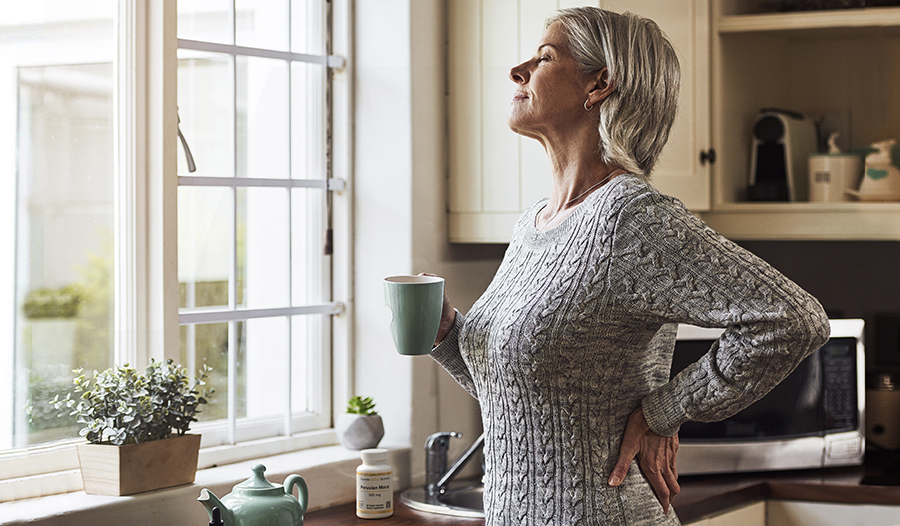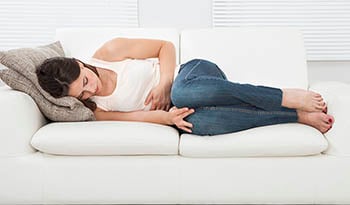The Best 9 Supplements and Herbs for Managing Menopause Symptoms
DISCLAIMER:This blog does not intend to provide diagnosis...
- In this article:
- Menopause Symptoms
- What Is Menopause?
- Supplements to Manage Menopause Symptoms
- Herbal Remedies for Menopause
- Takeaway

Menopause symptoms are estimated to affect up to 85% of women during this period of life and can drive you crazy and make you (and those around you) miserable. To compound matters, menopause often coincides with other midlife stressors like divorce, career change, empty nest syndrome, and caring for elderly parents.
You can’t prevent menopause. It’s a natural phase of life, one that can even be liberating.
There are supplements you can take and lifestyle changes you can make to manage and get relief from menopause symptoms, which are. Taking steps to support your body is empowering and will help you optimize your health and wellbeing as you age.
Menopause Symptoms
Common menopause symptoms include hot flashes and chills, mood changes and anxiety, fatigue, insomnia, memory problems, trouble concentrating, vaginal dryness, acne, thinning hair and bones, weight gain, sore breasts, and reduced libido.
What Is Menopause?
Many women dread menopause and even see it as a medical emergency, disorder, or disaster. But like puberty, it’s a normal, natural transition that happens as women age. The only exception is medical menopause, which occurs when the ovaries are surgically removed, as a result of some cancer treatments, and with certain autoimmune diseases.
Menopause is defined as both the natural ending of menstruation and the time during which the cessation occurs.
When Does Menopause Occur?
Also known as climacteric, menopause usually happens between the ages of 49 and 52. About 5 percent of women experience menopause in their early 40s, and 1 percent experience premature menopause before they hit 40.
Genetics (i.e. when your mother reached menopause), overall health, and lifestyle (smokers tend to go into menopause earlier than nonsmokers) can help determine when menopause naturally occurs.
What is Perimenopause?
Perimenopause, which literally means “around the menopause,” refers to the transitional time when menstrual cycles become irregular. You may experience long or heavy menstruation one month and skip a cycle the next. It’s often signaled by the physical symptoms associated with menopause and typically starts 4-10 years prior to menopause in your early to mid-40s.
What is Post-menopause?
Post-menopause is the term given to women who have gone a year without having any period. When you cease menstruating, you may still experience some symptoms associated with menopause due to hormonal changes, the aging process, or midlife stress.
What Causes Menopause?
The symptoms and physiological changes associated with menopause are triggered by changes in the body’s balance of sex hormones. The ovaries stop releasing eggs every month, and estrogen and progesterone levels start to fluctuate. High levels of estrogen can cause heavy bleeding and breast tenderness. Low levels can trigger hot flashes, night sweats, bone loss, headaches, and insomnia.
Supplements to Manage Menopause Symptoms
While hormone replacement therapy (HRT) has been the primary way to treat menopausal symptoms, it is associated with health risks, so many women cannot or choose not to use it.
It’s estimated that over half of women use complementary and alternative medicine to treat their symptoms, and 60 percent feel these alternative methods are an effective way to get relief. These practices include mind-body techniques (meditation, aromatherapy, and yoga), whole-body approaches (acupuncture, reflexology, and homeopathy), and supplements (vitamins, herbs, and minerals).
Health Benefits of Meditation: Read more.
Here are some supplements that may help with menopause symptoms.
Melatonin
Melatonin is a hormone naturally made by the pineal gland that helps regulate sleep-wake cycles. Since insomnia is a common menopause symptom and melatonin declines with age, taking it may help improve sleep.
Not only can melatonin help you sleep, but a small study also found that compared to controls, women who took 3mg of melatonin showed an improvement in physical symptoms associated with perimenopause. The study also found that melatonin supplementation may help prevent bone loss, but more research is needed.
Additionally, a study of 3mg melatonin supplementation in perimenopausal women for 6-months found significant improvements in thyroid function and menopause-related depression.
Calcium and Vitamin D
Decreasing levels of estrogen during perimenopause can have a negative impact on bone health. To protect your bones, it’s important to consume adequate amounts of certain vitamins and minerals, especially calcium and vitamin D.
The RDA for calcium is 1,000mg a day for women between 18 and 50. After age 50, the RDA increases to 1,200mg. You can get calcium from foods, supplements, or both. Calcium is found in dairy and soy products, fortified beverages, fish (with bones such as sardines), and green leafy vegetables.
Whether your calcium comes from food or supplements it’s important to get adequate vitamin D to support calcium absorption. Sunlight is the natural source of vitamin D, but many people don’t get enough, especially individuals with dark skin and those who live in the north. The US Institute of Medicine recommends an average daily intake of 400-800 IU, but some studies recommended higher levels of 1000-4000 IU, the safe upper limit.
Other important nutrients for bone health include vitamin C, vitamin K, potassium, and magnesium. To get adequate amounts, eat plenty of plant foods (especially fruits, vegetables, and beans). You may also want to take a good multivitamin for your age and gender to ensure you’re covering your nutritional bases. Research has also shown that taking 5g of collagen peptides daily may increase bone mineral density in post-menopausal women.
Exercise is another great way to increase bone density and muscle mass, which tends to decrease due to declining estrogen levels. To further support your muscle mass, make sure to eat enough protein. The RDA for protein for women over 50 is higher than it is for younger women: 1 to 1.5 grams per kilogram of weight (1 kilogram = 2.2. pounds). Aim to consume 20-25 grams at each meal.
Herbal Remedies for Menopause
Women have been using traditional herbal remedies to manage menopause and symptoms for centuries and treat everything from depression, anxiety, and insomnia to PMS. Some of the most popular herbs to promote sleep and reduce anxiety include valerian, lavender, passionflower, and chamomile.
Herbs and other plants work with the body to promote healing and can be gentler than pharmaceuticals. They can be taken as pills, tinctures, or teas. Some can be incorporated into foods like smoothies, soups, and stews. It’s important to note that herbal medicine can be powerful so it’s a good idea to talk with your physician about what you are taking. Many doctors also incorporate complementary and integrative care into their practices.
Here are some other herbs that may be effective for managing menopause symptoms.
Black Cohosh
One of the most popular and widely studied herbs for treating menopause is black cohosh. First used by Native Americans and also known as “bugbane” because it was utilized as an insect repellent, the plant’s roots are harvested in the fall and used either fresh or dried for medicinal purposes. The plant contains chemicals that affect the immune and nervous systems and may also help modulate estrogen.
While more research is needed, a randomized clinical trial comparing black cohosh extract combined with St. John’s wort (more on that below) to a placebo found that scores on the Menopause Rating Scale were cut in half in the treatment group compared to a 19% reduction in the placebo group. Compared to the placebo group, depression also significantly improved in the treatment group.
St. John’s Wort
St. John’s wort is a wild plant that has been used for centuries to boost mental health. In Europe, it is prescribed for depression and is also sold as a dietary supplement.
Research looking at the effect of 12-weeks of taking St. John’s wort three times a day found that the herbal remedy substantially improved both psychological and psychosomatic symptoms in women complaining of menopausal symptoms. Another study found that compared to controls, women treated with St. John’s wort had significantly better menopause-specific quality of life and fewer sleep issues. A decrease in hot flashes was also observed in the women taking St. John’s wort.
Wild Yam
Known as a natural alternative to estrogen therapy for menopause symptoms, wild yam is a tuber that has been used in traditional Chinese medicine to treat symptoms associated with menopause for centuries. Often incorporated into creams, it contains a chemical called diosgenin that in a laboratory can be turned into various steroids including estrogen. While the body does not appear to convert wild yam into estrogen, the plant may contain other chemicals that have an estrogen-like effect.
While more research is needed to demonstrate its effectiveness, a randomized clinical trial of 50 women who took 12mg of purple yam twice a day reported significant improvements in menopausal symptoms (mostly psychological) as compared to controls.
Dong Quai
A key ingredient in Chinese herbal medicine and member of the carrot and celery family, dong quai is frequently used to enhance the immune system and reduce inflammation. It’s often referred to as “female ginseng.” It is used as a remedy to balance women’s hormonal system and treatment for both menstrual cramps and menopause.
Research on dong quai’s impact on menopausal symptoms has been mixed, with some studies finding a benefit and others finding no significant improvement. A 3-month randomized controlled trial comparing Dong quai combined with chamomile to a placebo found that 90-96 percent of women taking the remedy reported clinically significant improvements in the frequency and intensity of hot flashes.
A 12-week, randomized clinical trial found that women who took dong quai combined with black cohosh, milk thistle, red clover, American ginseng, and chaste berry had a significant reduction in hot flashes and night sweats. More research is needed to determine if dong quai has benefits on its own. It’s important to note that dong quai has safety precautions and can interact with both drugs and other herbs.
Maca
Native to the Andes Mountains in Peru, maca is a cruciferous vegetable and member of the mustard family. The root is used in traditional medicine to increase fertility and libido. Commonly used in cooking in Peru, it has a deep, earthy flavor. High in vitamin C, copper, and iron, it can also be taken as a supplement and comes in a powder, which can be added to smoothies and other dishes.
A review of randomized clinical trials comparing maca versus a placebo for treating menopausal symptoms provided favorable but limited evidence for its effectiveness. Animal studies have shown that supplementing with maca potentially could prevent post-menopausal bone loss.
Phytoestrogens
Phytoestrogens are plant compounds that may balance estrogen levels. They are found in several plants including soy, red clover, flaxseed, and hops. In Japan, where soy foods are a dietary staple, women report significantly fewer menopausal symptoms. A review of over 500 studies concluded that “Phytoestrogens appear to reduce the frequency of hot flushes in menopausal women, without serious side-effects.”
Takeaway
It’s important to understand that each woman experiences menopause differently. Some sail through it while others struggle. Whatever you are experiencing, be easy and gentle with yourself, and double down on the self-care.
Finally, take the advice of Dr. Christiane Northrup who says in her book The Wisdom of Menopause: “Menopause is an exciting developmental stage—one that, when participated in consciously, holds enormous promise for transforming and healing our bodies, minds, and spirits at the deepest levels.”
References:
- Al-Akoum M, Maunsell E, Verreault R, Provencher L, Otis H, Dodin S. Effects of Hypericum perforatum (St. John's wort) on hot flashes and quality of life in perimenopausal women: a randomized pilot trial. Menopause. 2009 Mar-Apr;16(2):307-14. doi: 10.1097/gme.0b013e31818572a0. PMID: 19194342.
- Bellipanni G, DI Marzo F, Blasi F, Di Marzo A. Effects of melatonin in perimenopausal and menopausal women: our personal experience. Ann N Y Acad Sci. 2005 Dec;1057:393-402. doi: 10.1196/annals.1356.030. PMID: 16399909.
- Dalal PK, Agarwal M. Postmenopausal syndrome. Indian J Psychiatry. 2015;57(Suppl 2):S222-S232. doi:10.4103/0019-5545.161483
- Gonzales C, Cárdenas-Valencia I, Leiva-Revilla J, Anza-Ramirez C, Rubio J, Gonzales GF. Effects of different varieties of Maca (Lepidium meyenii) on bone structure in ovariectomized rats. Forsch Komplementmed. 2010;17(3):137-43. doi: 10.1159/000315214. Epub 2010 Jun 16. PMID: 20616517.
- Grube B, Walper A, Wheatley D. St. John's Wort extract: efficacy for menopausal symptoms of psychological origin. Adv Ther. 1999 Jul-Aug;16(4):177-86. PMID: 10623319.
- König D, Oesser S, Scharla S, Zdzieblik D, Gollhofer A. Specific Collagen Peptides Improve Bone Mineral Density and Bone Markers in Postmenopausal Women-A Randomized Controlled Study. Nutrients. 2018 Jan 16;10(1):97. doi: 10.3390/nu10010097. PMID: 29337906; PMCID: PMC5793325.
- Lee MS, Shin BC, Yang EJ, Lim HJ, Ernst E. Maca (Lepidium meyenii) for treatment of menopausal symptoms: A systematic review. Maturitas. 2011 Nov;70(3):227-33. doi: 10.1016/j.maturitas.2011.07.017. Epub 2011 Aug 15. PMID: 21840656.
- Naoum, K. D. (2021, June 23). Say so long to hot flashes and mood swings with the 10 best menopause supplements for women. Woman's World. Retrieved October 4, 2021, from https://www.womansworld.com/gallery/health/best-menopause-supplements-for-women-over-50-172296.

 By Dr. Ellen Albertson, PhD, RDN, NBC-HWC
By Dr. Ellen Albertson, PhD, RDN, NBC-HWC


